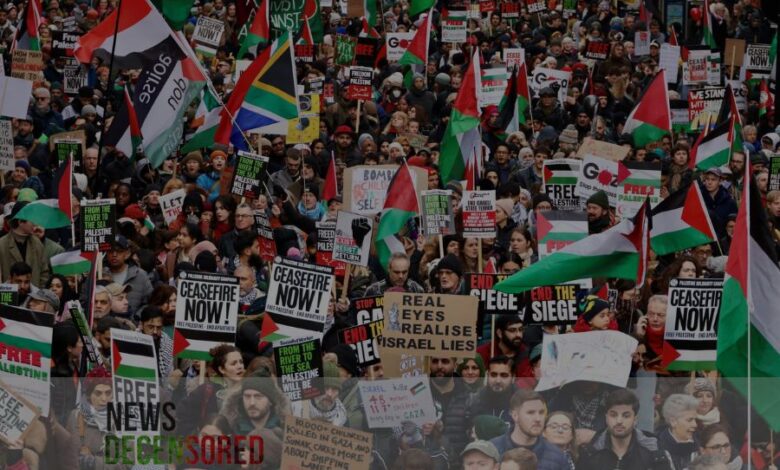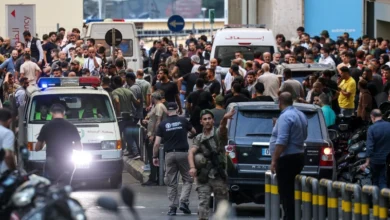Germany’s campaign against Israel’s critics betrays European values.

I discussed the European media in a forum with my German colleagues a few months ago. The conversation was lively and quickly moved from industry issues to broader topics such as German memory culture and the 2008 financial crisis.
Surprisingly, my German colleagues found it inappropriate to criticize the Greek political position at the time of crisis, and they also found it improper for me to speak about issues related to German history, such as the Holocaust. They explained that “you cannot enter into the self-experience and history of others, so it is better to avoid that.” I couldn’t disagree more.
Suppose we refrain from engaging in critical discussion. In that case, we cannot subscribe to what we believe is morally right or hold authority to account – and we end up simply reaffirming our own ethnic, religious, ideological, or national alliances. To paraphrase Edward Said, we cannot show true solidarity if we do not criticize.
We cannot afford not to criticize a power when it blatantly attacks the values and principles it is supposed to uphold and protect. I thought about this discussion I had with my German colleagues when I read about the police raid on the Palestinian Congress in Berlin on April 12.
The violent interruption and eventual cancellation of the pro-Palestine conference marked a worrying escalation in the repression of the Palestinian solidarity movement that has been underway in Germany and throughout the West for the past six months.
German police stormed the venue of the Palestinian conference, organized by Jewish Voice for Peace in cooperation with DiEM25 and civil rights groups. They closed it by cutting off electricity, confiscating microphones, and arresting some participants.
Then, in an unprecedented move, it issued a “Betätigungsverbot” (ban on activities) against Yanis Varoufakis, Ghassan Abu Sitta, and Salman Abu Sitta – three key speakers.
As a result, former Greek Finance Minister Yanis Varoufakis, a prominent figure in the global progressive movement, will not be allowed to talk about Palestine in Germany, not even via a Zoom call, and it is unclear whether he will be able to stand with the German party DiEM25 in the run-up to the elections. European in June.
The intervention made it very clear that any criticism in Germany these days of the State of Israel and its behavior in Gaza is considered anti-Semitic and is treated as such.
Coupled with the new acceptance of far-right figures with a documented history of anti-Semitism due to their defense of Israeli policies against Palestinians, it paints a depressing picture of freedom of expression in one of Europe’s most robust democracies.
The contradiction here is stark. Pro-Israel politicians from the right-wing Alternative for Germany party, including those on trial for using literal Nazi slogans, can speak freely about the Israeli war on Palestine under the guise of “fighting anti-Semitism,” but Ghassan cannot.
Abu Sitta, Palestinian surgeon and university president of Glasgow, who worked in Gaza hospitals and documented war crimes during the recent Israeli attack on the Palestinian Strip, testified before the German public.
As Udi Raz, the Jewish activist who was arrested at the Palestinian Congress, said after his arrest, it seems that these days in Germany, you can only fight anti-Semitism if you support genocide.
We owe great respect to all those who resist authority in the name of humanity, peace, democracy, and universal values at a time when the clouds of war have cast their shadows over our world.
Just as we must never forget the Holocaust, we must do everything to stop the genocide against Palestinians today. Just as we supported the Iranian revolutionaries who took to the streets for human rights in 2020, today, we must support Jews and Israelis who oppose the genocide committed by the Israeli government.
We must criticize and resist all efforts to silence Palestinian expression and protect Israel from accountability in the name of combating anti-Semitism and protecting Jews in Germany and throughout the West.
As my German colleagues suggested during our discussion, we can criticize power only when its violations and abuses fall within the boundaries of our history and identity.
Only by resisting power and demanding the right to disagree in every context do we keep open accountability, democracy, and peace, where power works to close those possibilities.
As we are increasingly interconnected and engaged in global debates, we need to do the opposite to protect ourselves, shaped by experience and trauma. Edward Said once said: There is no solidarity before criticism. Speaking truth to power is the best way to show solidarity with the oppressed and the only way to build a better world for all.




